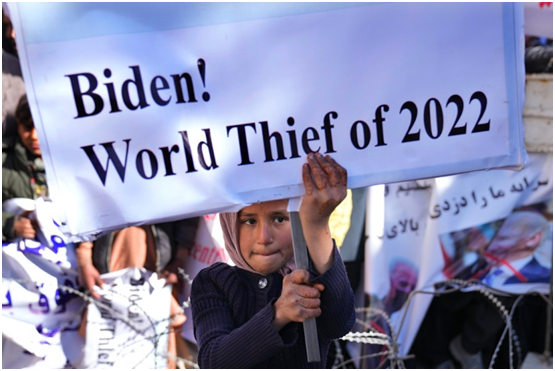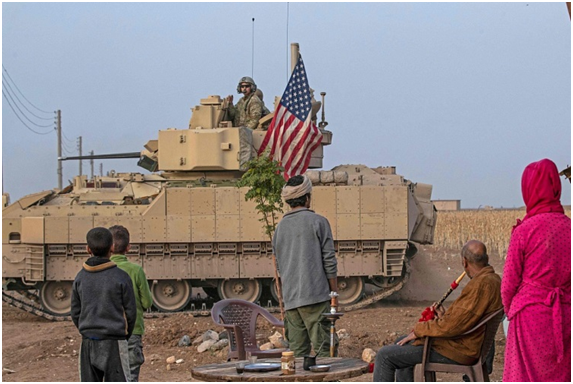
People hold anti-war banners and wave Iraqi flags during a protest in Baghdad, Iraq, on May 24, 2019. /Xinhua
People hold anti-war banners and wave Iraqi flags during a protest in Baghdad, Iraq, on May 24, 2019. /Xinhua
Editor's note: CGTN's First Voice provides instant commentary on breaking stories. The column clarifies emerging issues and better defines the news agenda, offering a Chinese perspective on the latest global events.
Following the resumption of diplomatic ties between Saudi Arabia and Iran, the Arab League (AL) agreed to reinstate Syria's membership last week. As the international community is cheering for the reconciliation wave in the Middle East, the U.S. openly expressed "criticism," claiming that Syria "should not be readmitted."
As a response to the regional developments, CIA Director Bill Burns made an unannounced visit to Saudi Arabia to air Washington's "frustration." In talks with Saudi Arabia's Crown Prince Mohammed Bin Salman, Burns stressed that the U.S. feels "blindsided" by Riyadh's decisions on Iran and Syria. And U.S. President Joe Biden decided to renew unilateral sanctions on Syria for one more year, to May 11, 2024.
In the meantime, Republican Senator Lindsey Graham expressed Washington's willingness to enhance its relationship with Riyadh to the next level in a "productive" and "candid" meeting with the Saudi Crown Prince. Playing the carrot-and-stick trick, the U.S. is arrogantly trying to woo Saudi Arabia back into its camp.

People protest against the U.S. move to unfreeze Afghanistan's central bank assets for 9/11 victims in Kabul, Afghanistan, February 15, 2022. /CFP
People protest against the U.S. move to unfreeze Afghanistan's central bank assets for 9/11 victims in Kabul, Afghanistan, February 15, 2022. /CFP
Forcing Middle East countries to act according to Washington's playbook is doomed to fail. More than 70 percent of the people in Muslim-majority countries doubt U.S. commitments to democracy in the region, according to a Gallup poll released in April, 2023. Most don't believe the U.S. will allow them to fashion their own political future, and don't see an economic commitment from Washington either.
American policymakers, as The Washington Post said in an opinion column, should not be shocked about the declining U.S. influence, as "It's a direct result of the policies pursued by the last three U.S. presidents."
Washington's presence in the Middle East has long disgruntled regional countries. For decades, the U.S. has been cultivating agents and instigating color revolutions in the region. For its hegemonic status, the U.S. has repeatedly stoked confrontations and willfully launched wars – dragging the entire Middle East region into an abyss of misery.
The wars in Afghanistan and Iraq, in which the U.S. has been playing a leading role, have killed hundreds of thousands of civilians. The CIA-instigated Arab Spring resulted in 1.4 million civilian casualties. Washington's reluctance in easing sanctions in quake-hit Syria is responsible for tens of thousands of deaths, as international aid teams missed the Golden 72 hours for rescue.

A U.S. armored military vehicle drives on the outskirts of Rumaylan in Syria's northeastern Hasakeh province, March 27, 2023. /CFP
A U.S. armored military vehicle drives on the outskirts of Rumaylan in Syria's northeastern Hasakeh province, March 27, 2023. /CFP
The Middle East wants peace, not war. This is why regional countries welcome China's role as a mediator in conflicts. China leads the U.S. in popularity among most Middle East countries, according to Arab Barometer, a nonpartisan research network based at Princeton University. Through its mutually beneficial cooperation, China has increased levels of economic engagement across the region.
The Middle East is not the backyard of any country. Having suffered decades of wars and conflicts, people in the region yearn for peace. Reconciliation and peaceful development is an irreversible trend. "The Middle East has actually already entered a largely de-Americanized era – the era of fluctuating, realist, pragmatic, fluid, radically open, and quite unpredictable hybrid alliances in order to give itself more space to maneuver, and more options for the sake of sovereignty," Alain Gabon, Associate Professor of French Studies and chair of the Department of Foreign Languages & Literatures at Virginia Wesleyan University, said in an opinion column published in Middle East Eye.
The Middle East's yearning for peace means forcing regional countries into acting according to the American playbook is a mission impossible. The U.S. should learn its lesson before making futile attempts at reversing this trend.
(If you want to contribute and have specific expertise, please contact us at opinions@cgtn.com. Follow @thouse_opinions on Twitter to discover the latest commentaries in the CGTN Opinion Section.)